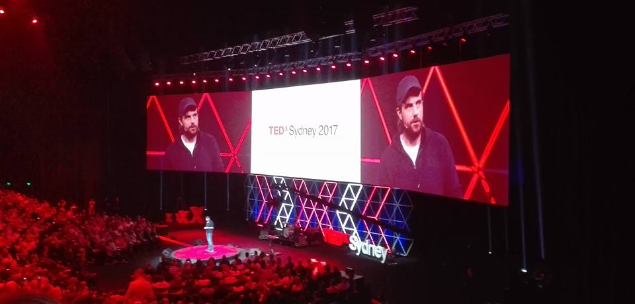Mike Cannon-Brookes, the tech billionaire in the hat and the hoodie, has spoken candidly about his struggle with imposter syndrome while at the helm of runaway start-up success Atlassian.
In his TEDxSydney address on Friday (16 June), the Atlassian co-CEO and co-founder described imposter syndrome as the “feeling of being well, well out of your depth” while “entrenched” in a given situation, business or otherwise. In these situations, he continued, “you know you’re not skilled enough, experienced enough or qualified enough to justify being there, yet you are there and you have to figure a way [through it] because you can’t just get out”. He revealed that despite the fact that Atlassian has thousands of employees and millions of users worldwide, he “frequently” feels out of his depth: “Most day, I still feel like I…don’t know what I’m doing”.
Cannon-Brookes shared examples, from his career, where he had felt “like a fraud” and “just kind of guess-slash-bullshitted” his way through a situation, all the while “petrified” someone was going to call him out. These included attending board meetings in a tee shirt while “surrounded by suits” and “feeling like a five-year-old” when acronyms began “flying around”. To save face, Cannon-Brookes said he would “surreptitiously” write down the acronyms in his notebook so he could look them up Wikipedia later on.
He also admitted feeling out of his depth in the early days of Atlassian, when he and co-founder Scott Farquhar were handling a lot of the jobs themselves: “when people [called] up asking for accounts payable, I would freeze and think ‘wait…are they asking for money or giving it to us?’ I would cover he mouth piece of the phone and say ‘Scott, you’re in accounts’ and pass it across.”
Cannon-Brookes told audience members that the felt like an imposter when he and Farquhar were, to their surprise, jointly named Ernest & Young’s Eastern Region Young Entrepreneur of the Year in 2006: “[I was] so surprised, in fact, that having looked at the list of people we were up against, I didn’t even turn up to the award ceremony. Scott collected the gong by himself”. He said he only felt more out of his depth when Ernest & Young subsequently handed them both the Young Entrepreneur of the Year award and the Entrepreneur of the Year award – at the national level. At the time, Atlassian was only four years old with a workforce of around 70.
An encounter at the 2006 World Entrepreneur of the Year Awards in Monte Carlo, where he and Farquhar were representing Australia, helped Cannon-Brookes come to terms with how he felt.
“I was sitting next to a lovely man… the winner from Portugal,” he said. “At 65, he’d been running his business for 40 years, he had 30,000 employees and he had $4b Euro in turnover. After a couple of wines, I remember admitting to him that [Atlassian] did not deserve to be there, that we were well out of our depth…He paused and looked at me and said he felt exactly the same way and he suspected all the winners were feeling that way. And that despite not knowing Scott or I or really anything about technology, he said we were obviously doing something right and should probably just keep going.
“This was a pretty big lightbulb moment for me. One, I realised other people felt this as [I did]. And two, I realised it doesn’t go away with any form of success. I had assumed successful people didn’t feel like frauds and now know the opposite is more likely to be true”.
Instead of allowing himself to become paralysed by his imposter syndrome, Cannon-Brookes said that, with an awareness of it, he tries to use it to his advantage. For him, this has meant trying to learn as much as he can about the unfamiliar situations he finds himself in, “motivated by my fear of generally looking like an idiot”.
“It’s okay to be out of your depth sometimes,” he said. “It’s okay to be in a situation where you can’t push the ejection problem, so long as you don’t freeze, so long as you harness the situation, don’t be paralysed and try and turn it into some sort of force for good.”
“The most successful people I know don’t question themselves but they do regularly question their ideas and their knowledge. They know when the water is way too deep, and they’re not afraid to ask for advice. They don’t see that as a bad thing…and they use that advice to hone those ideas, to improve them and to learn.”
See also: “I don’t deserve to be here”: the prevalence of imposter syndrome among successful leaders

